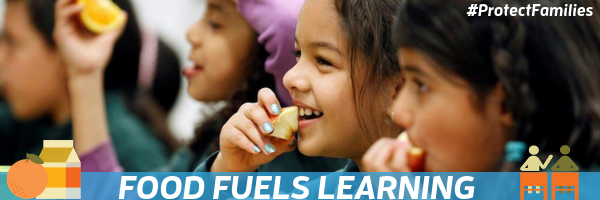|
Feed our Children-Feed our Future:
Act Now to Stop Trump's 'Public Charge' Rule
|
|
 |
When children are well-nourished, they perform better in school and have fewer health problems, which means more opportunity for lifelong success and stability. But under the Trump administration's proposed 'public charge' rule, fear of immigration consequences would prevent some families from accessing basic a
ssistance
programs that help their children stay healthy and well-nourished.
The harmful chilling effect of this proposal is already being felt across California.
Rumors about the rule, and confusion over who it applies to, are causing families to opt out of CalFresh and Medi-Cal-even for their U.S.-born children-for fear it might jeopardize their chances of becoming a legal permanent resident.
"Education is useless if we aren't meeting our
student's basic needs."
- Rachel Rice, PhD, high school teacher
Ensuring children have access to nutritious food is an important part of their education success.
Healthy and well-nourished children
are more likely to attend class, be ready to learn, stay engaged, and perform well in school.
For families with limited resources, CalFresh offers extra support for children's nutritional needs. Two-thirds of CalFresh-participating households are feeding and caring for children-that's over 2.5 million California children who benefit from the program each year.

During the school day, free and reduced-price meal programs provide students with food that fuels learning. And although school meals will not be considered under the new 'public charge test,' families are increasingly scared of taking any chances.
San Diego high school teacher, Rachel Rice, PhD, explains how immigration anxieties act as a barrier between students and school food, " We recently did our Federal Survey Cards for free and reduced-priced lunch. But because of the new immigration policies, we had an alarmingly low amount of students return their cards. They didn't want to have any paperwork that identified them, because they were afraid."
Free and Reduced Eligibility status drives many aspects of school funding and a drop in eligibility could, according to Rice, "have huge implications for our students."
With Senate Bill 138, California reduced its reliance on paper applications for school meals and expanded universally free meals-a major nutritional support for students and a big help for families who are fearful about sharing additional personal information. SB 138 doubled the number of schools serving two meals universally free (now more than 3,700 schools) by improving
direct certification
, an electronic process that connects low-income students enrolled in Medi-Cal or CalFresh to free school meals, without the need for a paper application.
Sadly, the proposed 'public charge' rule will discourage families from applying for school meals
and
other social services, which stifles schools' ability to educate students. Placing unnecessary barriers between students, social service programs, and school meals unfairly takes food away from immigrant students and their peers, compromising educational outcomes.
"We are just perpetuating the achievement gap,"
Rice said, making it harder for under resourced and/or students of color
to reach their full potential.
Take Action!
California is home to more than 10 million immigrants, and half of all California children have at least one immigrant parent. These children will determine California's future prosperity; we must speak out to protect them.
3 ways to protect our children and make your voice heard:
- Submit a comment Here.
Follow our template comments
here.
- Get at least 3 others to submit comment.
Forward this email or use the link (
http://bit.ly/FeedCAFutures
) to encourage your friends, family, and colleagues to submit their own personalized comments.
-
Share on social media.
Make sure to use the hashtags #ProtectFamilies and #Food4All. You can use the sample message below.
Let's #ProtectFamilies against the proposed 'public charge' rule which would strip immigrant families of their access to healthy food, health care, and housing. Our country is stronger when we invest in the nation's health. Take action now
http://bit.ly/ProtectCAFamilies
Stay in Touch
In partnership,
Team CFPA
|
 |
 |
|
|
|
|